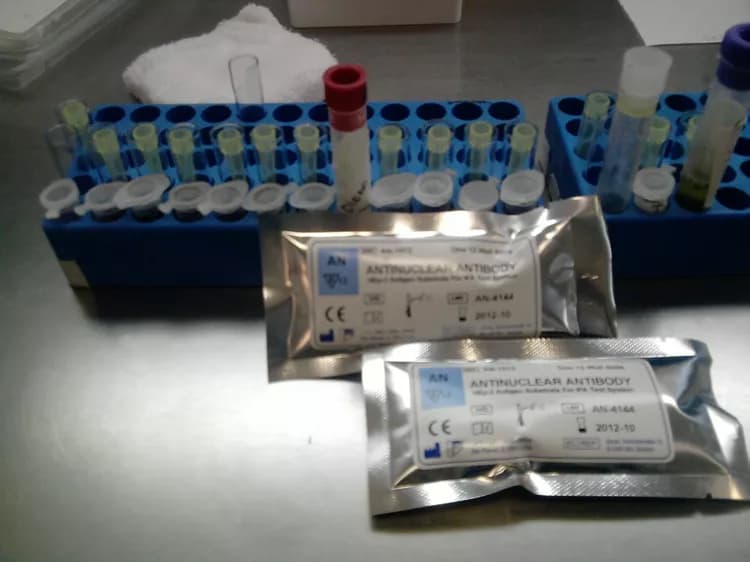What are the other Names for this Test? (Equivalent Terms)
- ANA (Anti-Nuclear Antibody) Test
- ANF (Anti-Nuclear Factor) Test
- Fluorescent Anti-Nuclear Antibody (FANA) Test
What is Anti-Nuclear Antibody (ANA) Test? (Background Information)
- Anti-Nuclear Antibody (ANA) Test is performed to detect the presence of anti-nuclear antibodies in blood
- Antibodies are protein substances produced by the body, in response to any foreign invaders, like bacteria, viruses, and other toxins
- Auto-antibodies are the antibodies, which fail to recognize ‘self’ from ‘non-self’ and they attack the body’s own cells. Anti-nuclear antibodies are one such type of auto-antibodies that react against various cell parts, including the cell nucleus, causing inflammation and cell destruction
- Anti-nuclear antibodies are usually detected via the ANA Test, which helps in diagnosing autoimmune diseases, such as systemic lupus erythematosus (SLE), rheumatoid arthritis, Sjögren syndrome, scleroderma, polymyositis, etc.
- This test is more specifically ordered to diagnose systemic lupus erythematosus (SLE), along with other investigations and tests, such as other auto-antibodies, erythrocyte sedimentation rate, and C-reactive protein (CRP), when the healthcare provider suspects the condition, based on the clinical signs and symptoms
What are the Clinical Indications for performing the Anti-Nuclear Antibody (ANA) Test?
Anti-Nuclear Antibody (ANA) Test may be prescribed in individuals, who show signs and symptoms related to systemic lupus erythematosus (SLE), or other autoimmune disorders. It has to be noted that about 95% of the cases of SLE, are positive for ANA Test.
Some of the signs and symptoms of autoimmune disorders include:
- Fatigue
- Muscle and joint pain (myalgia and arthralgia)
- Swelling of the joints
- Low-grade fever
- Rashes
How is the Specimen Collected for Anti-Nuclear Antibody (ANA) Test?
Following is the specimen collection process for Anti-Nuclear Antibody (ANA) Test:
Sample required: Blood
Process: Insertion of needle into a vein (arm).
Preparation required: No special preparation is needed prior to the test. However, certain medications, like oral contraceptives, procainamide, and certain diuretics, may affect the test result. It should be ensured that the healthcare provider is informed about all current medications one takes, before the test.
What is the Significance of the Anti-Nuclear Antibody (ANA) Test Result?
- The normal result range for adults is reported in titers, with different fluorescent patterns. The different fluorescent pattern includes homogeneous, speckled, nucleolar, and peripheral. In normal individuals the titers are negative when tested at 1:40 to 1:60 dilutions. A particular fluorescent pattern may sometimes give a clue to the healthcare provider, about the possible cause of raised ANA levels. Hence, it is important to not only look at the levels, but also the patterns of ANAs
- A negative result indicates that there are no autoantibodies present in the body. In such cases, the healthcare provider depends on the signs and symptoms, or the results of any other investigations. Sometimes the healthcare provider may also decide to repeat the test, or order some other new tests, in order to arrive at a definitive diagnosis
- A positive result indicates that there are autoantibodies present in blood. However, it is not always an indication that the patient has systemic lupus erythematosus, or other autoimmune disease. The ANA Test may be positive in some individuals, even without the presence of an autoimmune disease. Additional testing is required to confirm a final diagnosis, in such cases
Some of the disorders and conditions with positive Anti-Nuclear Antibody (ANA) Test results are:
- Systemic lupus erythematosus (SLE)
- Rheumatoid arthritis (RA)
- Sjögren syndrome (SS)
- Myositis (inflammatory muscle disease)
- Drug-induced lupus erythematosus
- Scleroderma (systemic sclerosis)
- Juvenile diabetes mellitus
- Addison disease
- Vitiligo
- Glomerulonephritis
- Pernicious anemia
- Collagen vascular disease
- Chronic liver disease
- Chronic infection
- Cancer
The laboratory test results are NOT to be interpreted as results of a "stand-alone" test. The test results have to be interpreted after correlating with suitable clinical findings and additional supplemental tests/information. Your healthcare providers will explain the meaning of your tests results, based on the overall clinical scenario.
Additional and Relevant Useful Information:
- The intake of some medications has been associated with elevated ANA levels. Some of the medications that can cause drug-induced ANAs, are hydralazine, isoniazid, procainamide, dilantin, etc.
Certain medications that you may be currently taking may influence the outcome of the test. Hence, it is important to inform your healthcare provider, the complete list of medications (including any herbal supplements) you are currently taking. This will help the healthcare provider interpret your test results more accurately and avoid unnecessary chances of a misdiagnosis.
Related Articles
Test Your Knowledge
Asked by users
Related Centers
Related Specialties
Related Physicians
Related Procedures
Related Resources
Join DoveHubs
and connect with fellow professionals


0 Comments
Please log in to post a comment.